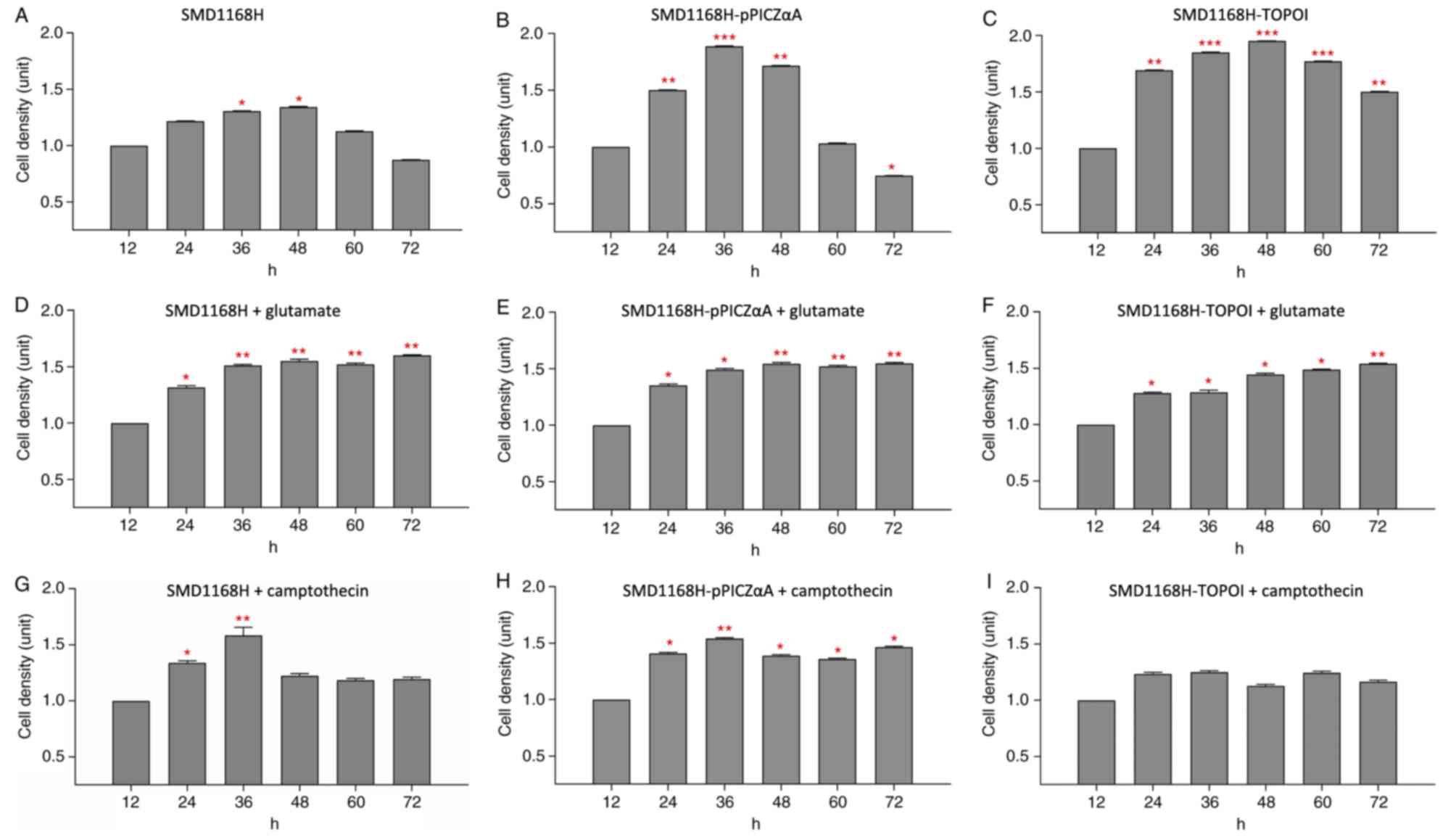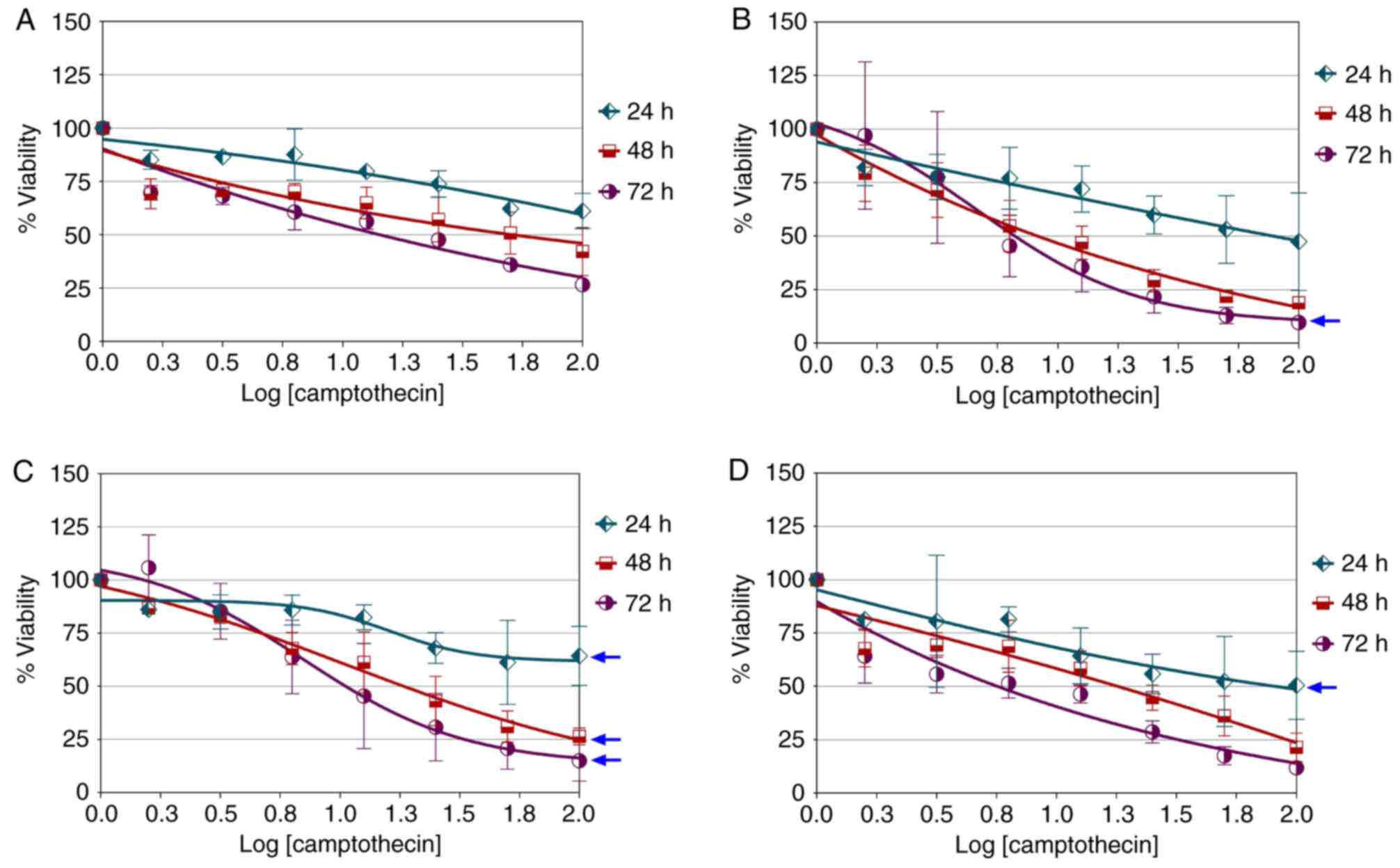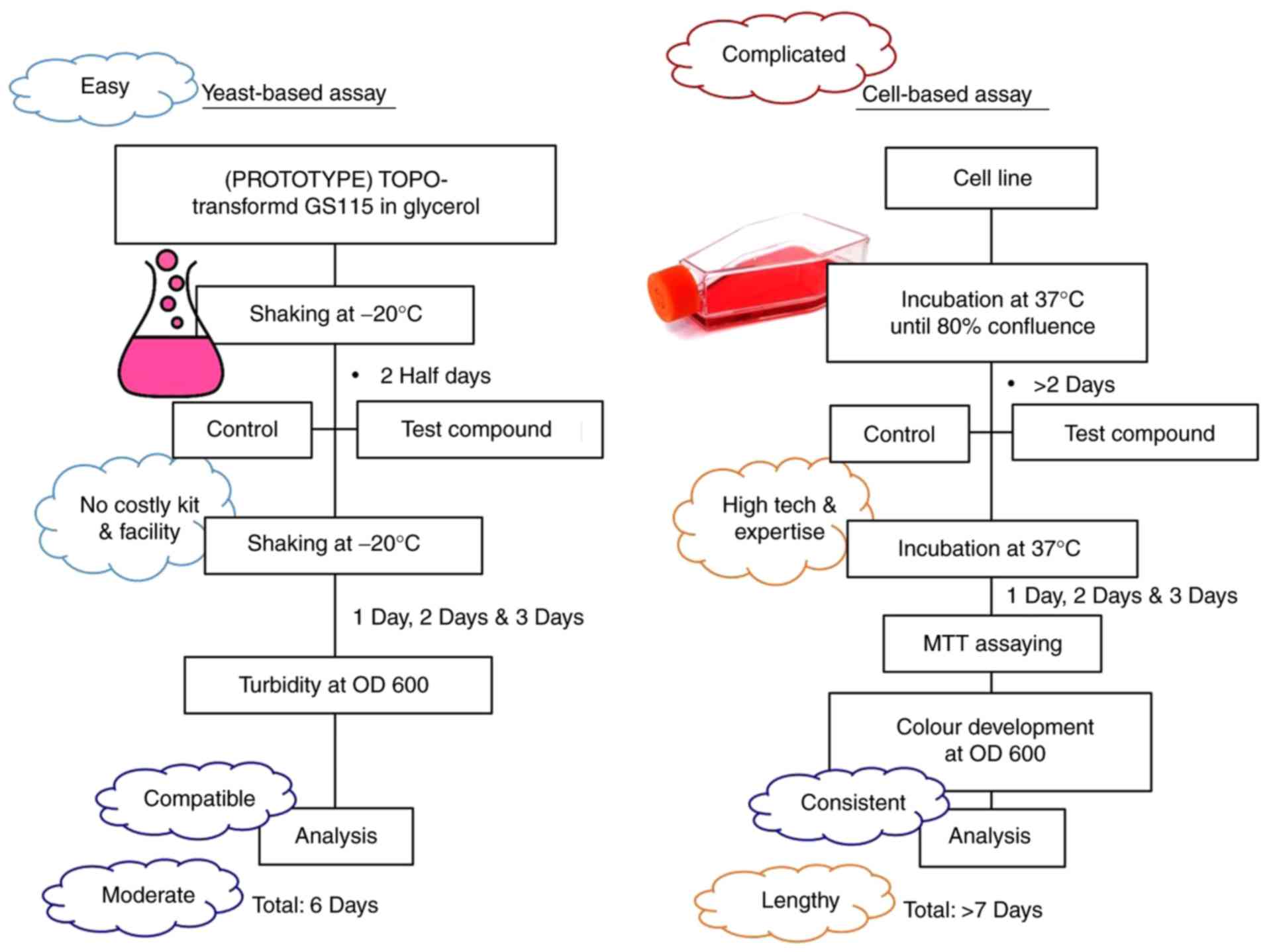|
1
|
Brearley MJ: Chemotherapy. Feline Soft
Tissue and General Surgery. Langley-Hobbs SJ, Demetriou JL and
Ladlow JF: Elsevier Ltd.; Amsterdam: pp. 161–167. 2014, View Article : Google Scholar
|
|
2
|
Lukong KE: Understanding breast cancer-The
long and winding road. BBA Clin. 7:64–77. 2017. View Article : Google Scholar : PubMed/NCBI
|
|
3
|
Cimino GD, Pan CX and Henderson PT:
Personalized medicine for targeted and platinum-based chemotherapy
of lung and bladder cancer. Bioanalysis. 5:369–391. 2013.
View Article : Google Scholar : PubMed/NCBI
|
|
4
|
Suzuki H, Asakawa A, Amitani H, Nakamura N
and Inui A: Cancer cachexia-pathophysiology and management. J
Gastroenterol. 48:574–594. 2013. View Article : Google Scholar : PubMed/NCBI
|
|
5
|
Ferioli M, Zauli G, Martelli AM, Vitale M,
McCubrey JA, Ultimo S, Capitani S and Neri LM: Impact of physical
exercise in cancer survivors during and after antineoplastic
treatments. Oncotarget. 9:14005–14034. 2018. View Article : Google Scholar : PubMed/NCBI
|
|
6
|
Wilkes GM: Targeted therapy: Attacking
cancer with molecular and immunological targeted agents. Asia Pac J
Oncol Nurs. 5:137–155. 2018. View Article : Google Scholar : PubMed/NCBI
|
|
7
|
Cragg GM, Boyd MR, Grever MR and Schepartz
SA: Pharmaceutical prospecting and the potential for pharmaceutical
crops. Natural product drug discovery and development at the United
States National Cancer Institute. Ann Missouri Bot Gard. 82:47–53.
1995. View
Article : Google Scholar
|
|
8
|
Hermiston TW and Kirn DH: Genetically
based therapeutics for cancer: Similarities and contrasts with
traditional drug discovery and development. Mol Ther. 11:496–507.
2005. View Article : Google Scholar : PubMed/NCBI
|
|
9
|
Hughes JP, Rees S, Kalindjian SB and
Philpott KL: Principles of early drug discovery. Br J Pharmacol.
162:1239–1249. 2011. View Article : Google Scholar : PubMed/NCBI
|
|
10
|
Katiyar C, Gupta A, Kanjilal S and Katiyar
S: Drug discovery from plant sources: An integrated approach. Ayu.
33:10–19. 2012. View Article : Google Scholar : PubMed/NCBI
|
|
11
|
Pan SY, Zhou SF, Gao SH, Yu ZL, Zhang SF,
Tang MK, Sun JN, Ma DL, Han YF, Fong WF and Ko KM: New perspectives
on how to discover drugs from herbal medicines: CAM's outstanding
contribution to modern therapeutics. Evid Based Complement Alternat
Med. 2013:6273752013. View Article : Google Scholar : PubMed/NCBI
|
|
12
|
Pharmaceutical Research and Manufacturers
of America: Pharmaceutical Industry Profile 2010. PhRMA;
Washington, DC: March. 2010
|
|
13
|
Chan MK, Lim SK, Miswan N, Chew AL,
Noordin R and Khoo BY: Expression of stable and active human DNA
topoisomerase I in Pichia pastoris. Protein Expr Purif.
141:52–62. 2018. View Article : Google Scholar : PubMed/NCBI
|
|
14
|
Zaks-Makhina E, Kim Y, Aizenman E and
Levitan ES: Novel neuroprotective K+ channel inhibitor identified
by high-throughput screening in yeast. Mol Pharmacol. 65:214–219.
2004. View Article : Google Scholar : PubMed/NCBI
|
|
15
|
Wu B, Altmann K, Barzel I, Krehan S and
Beitz E: A yeast-based phenotypic screen for aquaporin inhibitors.
Pflugers Arch. 456:717–720. 2008. View Article : Google Scholar : PubMed/NCBI
|
|
16
|
Demirbas D, Ceyhan O, Wyman AR and Hoffman
CS: A fission yeast-based platform for phosphodiesterase inhibitor
HTSs and analyses of phosphodiesterase activity. Handb Exp
Pharmacol. 135–149. 2011. View Article : Google Scholar : PubMed/NCBI
|
|
17
|
Ceyhan O, Birsoy K and Hoffman CS:
Identification of biologically active PDE11-selective inhibitors
using a yeast-based high-throughput screen. Chem Biol. 19:155–163.
2012. View Article : Google Scholar : PubMed/NCBI
|
|
18
|
Frame IJ, Deniskin R, Rinderspacher A,
Katz F, Deng SX, Moir RD, Adjalley SH, Coburn-Flynn O, Fidock DA,
Willis IM, et al: Yeast-based high-throughput screen identifies
Plasmodium falciparum equilibrative nucleoside transporter 1
inhibitors that kill malaria parasites. ACS Chem Biol. 10:775–783.
2015. View Article : Google Scholar : PubMed/NCBI
|
|
19
|
Asai A, Tsujita T, Sharma SV, Yamashita Y,
Akinaga S, Funakoshi M, Kobayashi H and Mizukami T: A new
structural class of proteasome inhibitors identified by microbial
screening using yeast-based assay. Biochem Pharmacol. 67:227–234.
2004. View Article : Google Scholar : PubMed/NCBI
|
|
20
|
Ang RP, Teoh LS, Chan MK, Miswan N and
Khoo BY: Comparing the expression of human DNA topoisomerase I in
KM71 and X33 strains of Pichia pastoris. Electron J
Biotechnol. 21:9–17. 2016. View Article : Google Scholar
|
|
21
|
Hong TB, Rahumatullah A, Yogarajah T,
Ahmad M and Yin KB: Potential effects of chrysin on MDA-MB-231
cells. Int J Mol Sci. 11:1057–1069. 2010. View Article : Google Scholar : PubMed/NCBI
|
|
22
|
Xuan H, Li Z, Yan H, Sang Q, Wang K, He Q,
Wang Y and Hu F: Antitumor activity of Chinese propolis in human
breast cancer MCF-7 and MDA-MB-231 cells. Evid Based Complement
Alternat Med. 2014:2801202014. View Article : Google Scholar : PubMed/NCBI
|
|
23
|
Pereira C, Lopes-Rodrigues V, Coutinho I,
Neves MP, Lima RT, Pinto M, Cidade H, Vasconcelos MH and Saraiva L:
Potential small-molecule activators of caspase-7 identified using
yeast-based caspase-3 and −7 screening assays. Eur J Pharm Sci.
54:8–16. 2014. View Article : Google Scholar : PubMed/NCBI
|
|
24
|
Bach S, Talarek N, Andrieu T, Vierfond JM,
Mettey Y, Galons H, Dormont D, Meijer L, Cullin C and Blondel M:
Isolation of drugs active against mammalian prions using a
yeast-based screening assay. Nat Biotechnol. 21:1075–1081. 2003.
View Article : Google Scholar : PubMed/NCBI
|
|
25
|
Liu X, Kramer JA, Swaffield JC, Hu Y, Chai
G and Wilson AG: Development of a highthroughput yeast-based assay
for detection of metabolically activated genotoxins. Mutat Res.
653:63–69. 2008. View Article : Google Scholar : PubMed/NCBI
|
|
26
|
Denny PW: Yeast: Bridging the gap between
phenotypic and biochemical assays for high-throughput screening.
Expert Opin Drug Discov. 16:1–8. 2018.
|
|
27
|
Voisset C, Daskalogianni C, Contesse MA,
Mazars A, Arbach H, Le Cann M, Soubigou F, Apcher S, Fåhraeus R and
Blondel M: A yeast-based assay identifies drugs that interfere with
immune evasion of the Epstein-Barr virus. Dis Model Mech.
7:435–444. 2014. View Article : Google Scholar : PubMed/NCBI
|
|
28
|
Sun Y, Wang Z, Tao J, Wang Y, Wu A, Yang
Z, Wang K, Shi L, Chen Y and Guo D: Yeast-based assays for the
high-throughput screening of inhibitors of coronavirus RNA cap
guanine-N7-methyltransferase. Antiviral Res. 104:156–164. 2014.
View Article : Google Scholar : PubMed/NCBI
|
|
29
|
Bilsland E, Sparkes A, Williams K, Moss
HJ, de Clare M, Pir P, Rowland J, Aubrey W, Pateman R, Young M, et
al: Yeast-based automated high-throughput screens to identify
anti-parasitic lead compounds. Open Biol. 3:1201582013. View Article : Google Scholar : PubMed/NCBI
|
|
30
|
Couplan E, Aiyar RS, Kucharczyk R, Kabala
A, Ezkurdia N, Gagneur J, St Onge RP, Salin B, Soubigou F, Le Cann
M, et al: A yeast-based assay identifies drugs active against human
mitochondrial disorders. Proc Natl Acad Sci USA. 108:11989–11994.
2011. View Article : Google Scholar : PubMed/NCBI
|
|
31
|
Bovee TF, Thevis M, Hamers AR, Peijnenburg
AA, Nielen MW and Schoonen WG: SERMs and SARMs: Detection of their
activities with yeast-based bioassays. J Steroid Biochem Mol Biol.
118:85–92. 2010. View Article : Google Scholar : PubMed/NCBI
|
|
32
|
Alaamery MA, Wyman AR, Ivey FD, Allain C,
Demirbas D, Wang L, Ceyhan O and Hoffman CS: New classes of PDE7
inhibitors identified by a fission yeast-based HTS. J Biomol
Screen. 15:359–367. 2010. View Article : Google Scholar : PubMed/NCBI
|
|
33
|
Sangkaew A, Krungkrai J and Yompakdee C:
Development of a high throughput yeast-based screening assay for
human carbonic anhydrase isozyme II inhibitors. AMB Express.
8:1242018. View Article : Google Scholar : PubMed/NCBI
|
|
34
|
Lichtenberg-Fraté H, Schmitt M, Gellert G
and Ludwig J: A yeast-based method for the detection of cyto and
genotoxicity. Toxicol In Vitro. 17:709–716. 2003. View Article : Google Scholar : PubMed/NCBI
|
|
35
|
Chatterjee S, Majumder CB and Roy P:
Development of a yeast-based assay to determine the
(anti)androgenic contaminants from pulp and paper mill effluents in
India. Environ Toxicol Pharmacol. 24:114–121. 2007. View Article : Google Scholar : PubMed/NCBI
|
|
36
|
MacLean MJ, Llordella MM, Bot N and Picard
D: A yeast-based assay reveals a functional defect of the Q488H
polymorphism in human Hsp90alpha. Biochem Biophys Res Commun.
337:133–137. 2005. View Article : Google Scholar : PubMed/NCBI
|
|
37
|
Chatterjee S, Kumar V, Majumder CB and Roy
P: Screening of some anti-progestin endocrine disruptors using a
recombinant yeast-based in vitro bioassay. Toxicol In Vitro.
22:788–798. 2008. View Article : Google Scholar : PubMed/NCBI
|
|
38
|
Lubrano S, Comelli L, Piccirilli C,
Marranci A, Dapporto F, Tantillo E, Gemignani F, Gutkind JS,
Salvetti A, Chiorino G, et al: Development of a yeast-based system
to identify new hBRAFV600E functional interactors. Oncogene.
38:1355–1366. 2019. View Article : Google Scholar : PubMed/NCBI
|
|
39
|
Jacobs PP, Inan M, Festjens N, Haustraete
J, Van Hecke A, Contreras R, Meagher MM and Callewaert N: Fed-batch
fermentation of GM-CSF-producing glycoengineered Pichia
pastoris under controlled specific growth rate. Microb Cell
Fact. 9:932010. View Article : Google Scholar : PubMed/NCBI
|


















